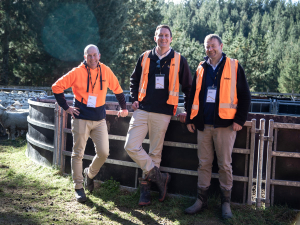State Farmer Delivers Solid Half-Year Result
State farmer Landcorp, trading as Pamu, is a forecasting a full-year net profit of around $100 million.
 Pāmu CE Mark Leslie, ASB General Manager Rural Banking Aidan Gent and Associate Minister of Agriculture Mark Patterson at Pāmu farm Aratiatia Station where the Pāmu Apprenticeship Scheme will be based.
Pāmu CE Mark Leslie, ASB General Manager Rural Banking Aidan Gent and Associate Minister of Agriculture Mark Patterson at Pāmu farm Aratiatia Station where the Pāmu Apprenticeship Scheme will be based.
ASB and Pāmu are joining forces with a new Sustainable Progress Initiatives programme designed to accelerate industry-good projects with social and environmental benefits for New Zealand’s agricultural sector.
The partnership will focus on a series of projects, including a new apprenticeship scheme to support young Kiwis into farming careers and a Methane Reduction Through Genetics programme set to look at ways to achieve more methane-efficient livestock, as well as encouraging the use of smart agri-data tools to inform decision-making such as FarmIQ and FARMAX.
Pāmu chief executive Mark Leslie says the state-owned enterprise is focused first on commercial sustainability and farm performance.
“In partnering for progress, like we are doing her with ASB, it benefits both Pāmu and the wider industry,” Leslie says. “I’m excited to use our scale, capability, and on-farm experience for better sustainability outcomes.”
He says that by working together, ASB and Pāmu can do more to meet consumer and market expectations through finding genetic solutions to reduce emissions and digital tools to provide transparency.
“And of course at the core of the future of agriculture are great people, hence our investment in the Pāmu Apprenticeship Scheme which will continue to attract talented individuals into the sector,” Leslie says.
ASB has invested $1 million over three years in Sustainable Progress Initiatives with Pāmu, building on the Government farmer’s broader support of the food and fibre sector.
ASB chief executive, Vittoria Shortt, says farmers today are facing myriad challenges.
“We want to support the industry to continue to adapt and innovate, as it has for generations. A productive, profitable, and sustainable food and fibre sector is critical for the future prosperity of New Zealand,” Shortt says.
“No two farms are the same, and through this partnership with Pāmu we are encouraging innovation and knowledge sharing at the farm gate,” she says.
Shortt says that Pāmu provides an ideal partner to find solutions that can help farmers address the significant issues facing them, supported by evidence.
“This exciting initiative sits alongside a number of other ASB initiatives and investments which focus on helping all farmers, including our customers, accelerate their progress toward becoming more financially and environmentally sustainable, in order to compete on the world stage.”
The Pāmu Apprenticeship Scheme aims to establish new career pathways for students into farming and the wider agricultural industry by building foundational skills. Registrations of interest can be made now and applications open in July. Apprentices will gain real-life, paid work experience on dairy and livestock farms, based at Aratiatia, near Taupō from January 2025.
The Methane Reduction Through Genetics project, which is closely aligned with the agricultural sector’s focus on lowering methane outcomes, is in progress with beef cattle, sheep, and in time, deer, to identify sires that emit the lowest volume of methane, and are the most efficient feed convertors.
A new testing facility at a Pāmu farm in Taupō will allow more advanced selection criteria for beef. In time, specific genes will be identified with the ability to reduce methane emissions. The new facilities will also be made available to industry partners as collaborators/investors who can use them for ongoing methane reduction and feed efficiency measurements including testing the efficacy of methane reduction solutions (e.g. feed additives, inhibitors, vaccines).
Under the Sustainable Progress Initiatives, farmers can access, at a discounted rate*, farm management software solutions FarmIQ and FARMAX (of which Pāmu is a majority shareholder).
“We know technology has a role in driving productivity, and that integration is key. For that reason, we’ve invested in FarmIQ, a cloud-based farm management software solution designed to streamline various aspects of farming operations,” says Leslie.
“It offers farmers an interactive farm map, simplifies compliance and assurance processes, tracks animal performance, optimises pasture and feed management, and provides health and safety tools. We want to make sure others in the industry benefit from better data capture and all the benefits that brings to a business,” he adds.
Dairy Women's Network (DWN) has announced that Taranaki dairy farmer Nicola Bryant will join its Trust Board as an Associate Trustee.
Rural Women New Zealand (RWNZ) says it welcomes the release of a new report into pay equity.
Red meat exports to key quota markets enjoyed $1.4 billion in tariff savings in the 2024-25 financial year.
Remediation NZ (RNZ) has been fined more than $71,000 for discharging offensive odours described by neighbours as smelling like ‘faecal and pig effluent’ from its compositing site near Uruti in North Taranaki.
Two kiwifruit orchards in the Bay of Plenty and one in Northland are this year's finalists for the Ahuwhenua Trophy competition.
The Government's chief science advisor, Dr John Roche says the key objective for the science sector in the coming year is bedding down the reforms which sees the merger of the previous entities.

OPINION: A mate of yours truly reckons rural Manawatu families are the latest to suffer under what he calls the…
OPINION: If old Winston Peters thinks building trade relations with new nations, such as India, isn't a necessary investment in…